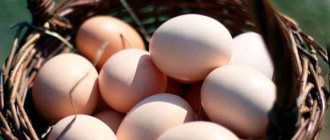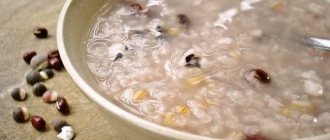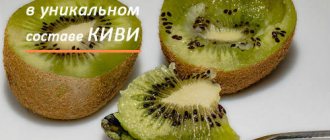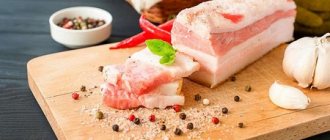The question of whether it is possible to eat buckwheat at night is primarily of interest to those who are losing weight or seeking to maintain the achieved results after losing weight. Buckwheat is a popular and affordable source of nutrients, but is it worth eating it on a diet, especially in the evening and at night? From this material you will learn about the properties of buckwheat and recommendations for its use not only in the process of losing excess weight, but also during intense training to gain muscle mass.
Diets and other ways to combat excess weight are very popular, because being slim is not only beauty, but also health. Obesity makes life difficult, prevents you from being active and creates psychological difficulties, but that's not all. Against this background, a huge number of concomitant diseases develop, such as diabetes, hypertension, atherosclerosis and many others. Therefore, the desire to lose weight and stay in shape is directly related to the quality and length of life.
When losing weight, nutrition becomes the main measure; exercise is also very useful, but it only enhances the results of a properly chosen diet. People understand this, so they have a lot of questions: what to eat on a diet, what you can eat and what you can’t. Particular attention is paid to evening meals. The work of all body systems is subject to circadian rhythms, therefore, at different times of the day, digestive and metabolic processes proceed differently. As night approaches, they slow down, which increases the risk of converting energy obtained from food into fat reserves. Part of the reason is that the main consumer of energy is the muscles; at night they do not work, but are at rest. Absorbed carbohydrates are broken down into glucose; the body cannot use it for activity, so it stores it in reserve.
Excess weight is not the only consequence of late dinner. The digestive system produces enzymes to break down and absorb nutrients from foods. At night, they can accumulate, which indirectly leads to the development of diabetes and the formation of gallstones. But that’s not all, the habit of overeating at night reduces the quality of rest, causes insomnia or makes sleep intermittent and not deep. As a result, the next day the person feels tired. If the situation is regularly repeated, it affects beauty, primarily the condition of the hair, elasticity and skin color. Insomnia, like obesity, entails associated diseases.
However, this does not mean that you cannot eat after six in the evening or other time. You should not go to bed in hunger pangs; this will also cause problems with sleep. It is recommended not to have large meals three hours before bedtime; during this same period you should be extremely attentive to the choice of foods. Let's figure out whether buckwheat is suitable for an evening snack.
Late dinner
Excess weight causes many diseases, the most dangerous of which are hypertension, diabetes, and atherosclerosis. Diets and the fight against excess weight have become increasingly popular in recent years, and the buckwheat diet, as one of the most effective, has many supporters. However, even among them, debates flare up on the topic: is it possible to eat buckwheat at night and when should the last meal before bed be.
The human body functions depending on the time of day and by night the processes responsible for the digestive system slow down. Even a light snack before bed can add extra pounds. This happens because the muscles involved in the process of processing and promoting glucose are relaxed at night and cannot fully perform their work. And unbroken glucose, entering the liver, leads to rapid deposition of adipose tissue.
Eating dinner before bed can also have other complications. Enzymes necessary for the breakdown of carbohydrates, proteins and fats accumulate in the body at night. Their lack during the day can give rise to the development of diabetes mellitus, and the bile secreted by the gallbladder can trigger the formation of gallstones. Snacking before bed will also lead to insomnia, weakness and fatigue in the morning.

To avoid harm to health, the last meal should be 3 hours before bedtime. After this, only herbal teas without sugar and water are allowed.
Importance of mode
During a diet, regimen plays a big role. Buckwheat is gradually absorbed by the body and dulls the feeling of hunger for a long time, but at the same time, the first days of the diet can be difficult from a psychological point of view. The need for snacks and large portions remains at the subconscious level. Therefore, it is important to distribute your day so that meals are at regular intervals. It is also important to go to bed no later than 11 pm.
If you follow a constant regimen, the body will get used to the time of eating and the feeling of hunger will no longer bother you. To make it easier to adapt to the new schedule, nutritionists allow you to eat a little low-fat cottage cheese or yogurt in the evenings after dinner, or drink a glass of 1% kefir.
Proper nutrition is the basis of everything
Only a well-designed diet is the key to success. That is, you must compose it in such a way that the products can make up for the deficiency of substances, without overdoing it with calories and carbohydrates. Buckwheat, of course, should be on the menu, but if you eat everything in a row, not counting BJU, then it will not make you healthier, and the calories from the cereal you eat can add pounds. Moreover, porridge at night will not do any good, and you will not lose weight from it if you have sat motionless all day, eating up your hunger with unhealthy and high-calorie foods. Yes, buckwheat is not a panacea in this case. If you can’t create your diet yourself, contact a specialist or find examples online.
For information! BZHU is an abbreviation that means proteins, fats and carbohydrates. When you count them, you understand what you need to eat to fill your daily requirement of substances and not go overboard with calories.
So, is it possible to eat buckwheat at night or not, you ask, considering that during the day you will also adhere to a healthy diet. Let's start with the fact that eating before bed is generally not recommended, including healthy buckwheat porridge. Your last meal should be three hours before you go to bed. Afterwards you can drink water, filling your body with fluid. Why can't you eat at night?
This is not just a tribute to fashion, they say, no food after six. No, this is our nature, our body must rest at night, the processes in it slow down. You even eat healthy buckwheat, thinking that you are not harming your health and figure, but in the end it stagnates inside, because your gastrointestinal tract is not as active as during the day. As a result, harmful fermentation processes begin, the formation of toxins, which are very quickly absorbed through the intestinal walls. Undigested food rots, gives off a foul odor, and is stored in fat.
Important! Scientists have proven that harmful substances in the body and stagnant processes significantly increase the risk of cancer.
So, every day you eat before bed, because otherwise you simply cannot sleep, and it often happens that people, thinking that buckwheat is dietary, eat it in excess in order to fall asleep without starving. As a result, the load on the gastrointestinal tract is high, and at some point you begin to notice that the skin is deteriorating, toxins are to blame, the weight does not go away or is gained, and there is still no energy. Disruptions begin, you are at a loss as to why the results are not what you expected. It’s just that even such healthy cereal every day before bed, especially in excess, can do more harm than good.
About the benefits of buckwheat
The effectiveness of buckwheat during dietary nutrition is explained by its beneficial properties, the absence of protein, which causes allergies, and low calorie content.
Buckwheat is recommended not only for people who are overweight, but also for:
- with chronic fatigue, frequent stress, depression;
- with reduced immunity,
- after poisoning and intoxication;
- with pathology of the gastrointestinal tract;
- for atherosclerosis, hypertension, cholesterolemia, anemia;
- for diabetes mellitus;
- with swelling;
- for osteoarthritis.
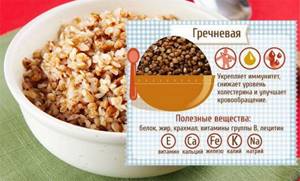
Buckwheat is rich in slow carbohydrates containing enzymes that inhibit the absorption of sugar into the blood. Slow carbohydrates not only give you a feeling of fullness, but are also absorbed in portions, releasing energy in parts. But if you eat a large portion of buckwheat porridge at night, the released energy, due to slow metabolic processes during sleep, will be deposited in the form of fat deposits.
Buckwheat contains a lot of minerals:
Of the vitamins, cereals contain large quantities of:
- nicotinic acid (B3);
- pyridoxine (B6);
- riboflavin (B2);
- thiamine (B1);
- folic acid (B9).

Buckwheat also contains a lot of organic acids - malic, oxalic, maleic, as well as such important amino acids as:
For athletes and those who carry out increased physical activity, the high content of a complex of glycine, arginine and methionine in buckwheat is important. These three amino acids are involved in the synthesis of creatine, which is necessary for normal energy metabolism in muscle tissue and nerve cells.
Among the microelements, buckwheat contains boron, iodine, iodine, zinc and cobalt.
Buckwheat for dinner - weight gain. Buckwheat porridge for muscles
Any cereal is, first of all, a source of complex carbohydrates, without which normal human life is impossible. But buckwheat is considered the most valuable for athletes.
Is buckwheat good for gaining muscle mass and not for losing weight?
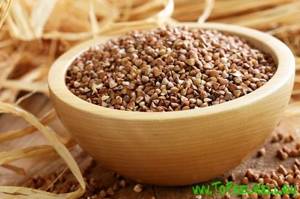
Nutritionists are confident that this product is universal and can be used for different purposes.
Benefit
Buckwheat is a rich source of carbohydrates and amino acids that help build muscle. A portion of buckwheat porridge eaten at lunch or breakfast can keep you feeling full for a long time. Buckwheat is also good for gaining muscle mass because it contains about 20 grams of protein (per 100 grams of dry product), the biological value of which exceeds 90%. For athletes and people seriously involved in sports, buckwheat porridge is an ideal source of energy that does not contain fat or simple carbohydrates. The high fiber content of buckwheat has a beneficial effect on the gastrointestinal tract. Thanks to its nutritional value, buckwheat will also help those who tend to be thin and have problems with muscle growth for gaining muscle mass. Of course, in addition to protein and amino acids, this cereal is rich in vitamins and minerals. It is believed that the content of zinc and iron in it is much higher than in any other cereals. However, this is an erroneous opinion: no less of these elements are contained in both wheat and oatmeal.
How to use
Despite the high concentration of protein in cereals, you shouldn’t lean too much on it. In addition to buckwheat porridge, it is worth including other sources of carbohydrates in your diet - rice, potatoes, durum wheat pasta, and legumes. You can eat up to 2 servings of buckwheat per day. Many trainers advise consuming porridge several hours before training, thereby charging the body with additional energy.
There are two types of it: prodel and kernel, split and whole kernels, respectively. Any type of buckwheat is ideal for gaining muscle mass. You can try different variations of dishes made from this grain. Prepare buckwheat porridge with vegetables, mushrooms, dried fruits and nuts or meat - it's up to you. In any case, remember that by consuming buckwheat alone to gain muscle mass, you are unlikely to see the desired results. To increase muscle volume, not only plant proteins are needed, but also animal proteins. The correct ratio of them, coupled with physical exercise, is what will help you effectively achieve muscle growth.
Buckwheat during a diet
When losing weight, you can eat buckwheat in the evening only a few hours before bedtime, but during the day you can eat it in unlimited quantities, provided it is properly prepared.
During a diet, it is better to steam the cereal in the evening in a thermos in hot water or soak it in kefir. To do this, you can use both regular kernels and green cereals. You cannot cook buckwheat with a lot of spices, sauces, fatty broths or gravy: this will lead to rapid weight gain instead of weight loss. It is also advisable to avoid butter, sugar and large amounts of honey.
Steaming the cereal is simple: pour a glass of kernels with 2 cups of boiling water and leave in a warm place for up to 10-12 hours. For diabetics, it is better to soak buckwheat in kefir using similar proportions.
Another option for proper and quick preparation: the cereal is soaked in boiling water in a ratio of 1:2 and left warm for 1-2 hours. Then add hot water and bring to a boil. The finished porridge can be seasoned with low-fat yogurt or kefir, tbsp. natural soy sauce or tsp. dark honey.
Reviews about the buckwheat diet
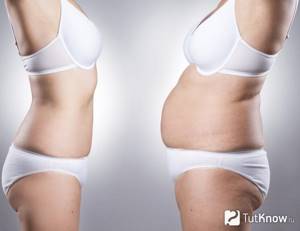
Every day the buckwheat diet is becoming more and more popular. And this is not surprising, because in just 7 days of eating buckwheat porridge you can lose about 2-4 kg of excess weight. However, it is not recommended to follow this technique for too long, otherwise you can cause great harm to your own body.
Ekaterina, 28 years old, Omsk
There was a need to quickly lose weight. I only had one month at my disposal. I decided to try the buckwheat porridge diet. The limited diet was the most unpleasant moment, because it’s hard to give up your favorite foods. But buckwheat is quite filling, so I didn’t feel hungry. During the day I tried to drink at least 1.5 liters of plain water. The result was pleasantly surprising - I lost 5 kg in 15 days. I plan to repeat this diet over time.
Irina, 35 years old, Kursk
Over the past six months I have tried a huge number of diets and after stopping them, the weight came back again. A friend recommended a buckwheat diet, I chose the 7-day option. The waist has decreased, and bowel function has improved. Buckwheat porridge is not my favorite product, but for the sake of a slim figure, you can tolerate it. Now this is my favorite diet that really brings results.
Olga, 20 years old, Moscow
Once a week I spend a fasting day on buckwheat. It is not difficult to endure one day of such nutrition, besides, it helps to bring the weight back to normal and improve the functioning of the whole body. The most important thing is to drink enough liquid during the fasting day.
Late dinner
Diets and the fight against obesity are very popular now. Being slim and beautiful is not only fashionable and attractive, but also good for your health. Not only does excess weight not make a woman look good, but it also leads to a number of complications. Working on your figure not only improves your appearance, but also prevents many diseases, such as atherosclerosis, hypertension and diabetes. So the answer to the question, is it worth watching your figure and nutrition, definitely - yes.
Following this question, the next question arises: what to eat during a diet? And, close to him: why is it so harmful to eat in the evening?
It’s worth starting with the fact that the functioning of the human body directly depends on the time of day. By nightfall, the processes responsible for digestive activity slow down, and this leads to the risk of becoming overweight. This happens due to the fact that the muscles responsible for converting glucose cannot cope with this at night. Its entry into the liver in an undigested form leads to the accumulation of fat in the body.
Late dinner entails other complications. Enzymes that are released to break down proteins, fats and carbohydrates tend to accumulate in the body at night. They can lead to diabetes, and the bile secreted by the gallbladder can lead to the formation of stones.
And this is not a complete list of problems that late-night snacking leads to. It is also worth mentioning restless sleep and subsequent fatigue and weakness. In addition to health, this can also affect your appearance: the beauty and strength of your hair, freshness, elasticity and skin color are at risk.
Scientists recommend having dinner three to three and a half hours before bedtime, without consuming excessive calories.
How to eat buckwheat to lose weight, not gain weight
If a significant part of the diet consists of greens, healthy vegetables, high-quality proteins, and fermented milk products, then healthy carbohydrates in the form of buckwheat will contribute to weight loss. It is also important to adhere to the following recommendations :
- The last meal of cereal is at least 4 hours before bedtime.
- 30 minutes before breakfast drink 1 tbsp. warm water with a slice of lemon.
- Choose the highest grade cereal, with whole kernels, without damage.
- Before steaming buckwheat, it is washed several times in water.
Sweets and starchy foods are excluded from the diet, and physical activity is added to the daily routine.
About the benefits of buckwheat
Knowing how to properly organize your diet, you can also think about what to include in it. As already mentioned, buckwheat has many beneficial properties and is suitable for almost all people. It can be consumed starting from six months, it is low-calorie, which makes it safe for people who are overweight, and also does not contain sugar.
The calorie content of boiled buckwheat is only 110 kilocalories per 100 grams.
In addition, buckwheat contains vitamins B and E, fiber and amino acids. It is recommended for people who have anemia or diabetes, as it has a positive effect on the walls of blood vessels and blood characteristics.
Buckwheat is also useful for those who combine diet with exercise. The high protein content makes this product simply indispensable for regular physical activity.
Buckwheat also contains so-called slow carbohydrates, which contain substances that inhibit the absorption of sugar into the blood. Hence the long feeling of fullness that occurs after eating porridge, hard fruits and many vegetables. The opposite example is chocolate containing a high amount of calories and carbohydrates, which you cannot get enough of.
Based on the information received, the answer to the question smoothly follows: is it possible to eat buckwheat at night? Experts' answer: no, you can't. This solution lies in the slow carbohydrates mentioned above. Although they keep you full throughout the day and are digested in portions, slower metabolism at night will cause them to take longer to digest, disrupting sleep and leading to fat storage.
Buckwheat is useful for losing weight, but harmful at night, like most foods.
If not buckwheat, then what?
No matter how much we love buckwheat, we shouldn’t eat it at night. But what then can you afford for dinner or a snack before bed? The evening meal should provide sufficient energy and create conditions for sleep and rest. The following products meet these requirements.
Vegetables
Any non-starchy vegetables, raw or cooked, will do. Preference should be given to gentle cooking methods: boiling, stewing, baking without oil, steaming. One of the most important components of a healthy diet, vegetables are ideal for a late-night snack. In addition, they can be used to prepare many healthy dishes: salad, stew, baked or grilled vegetables. Their advantages include low calorie content, normalization of intestinal microflora and the functioning of the entire gastrointestinal tract, cleansing the body and strengthening the immune system.
Bell peppers, cabbage, cucumbers, celery, tomatoes and greens can be consumed in any quantity and combination. In the case of pumpkin, carrots and beets, you need to build on the permissible calorie content. You should not eat legumes at night; they are appropriate in a healthy diet, but they are difficult for digestion, so their consumption should be moderate and occur at earlier hours.
Dairy products
Greek yogurt, kefir, yogurt, fermented baked milk make us full, but at the same time contain an average of 50-70 calories per 100 grams, and are also very easily and quickly digested. We are talking about natural fermented milk products without sweeteners and other additives. Whole dairy products are healthier and more satisfying than low-fat ones, but they are higher in calories, this must be taken into account.
From these light drinks, the body receives the protein it needs, as well as a portion of calcium. After such a snack there will be no heaviness in the stomach and problems with sleep. The live bacteria they contain have a positive effect on the intestinal flora, reduce the acidity of gastric juice, soothe and relax digestion. This is exactly what you need in the evening.
Poultry meat
Chicken breast or turkey fillets contain only 90-110 calories per 100 grams. This is one of the best sources of protein. For dinner, you can eat boiled, baked or stewed fillet, complementing it with vegetable stew as a side dish or a salad of fresh vegetables. After such a meal, hunger will definitely not wake up until the morning.
However, chicken and turkey have a drawback: they often cause allergies. An alternative for allergy sufferers can be rabbit meat. This lean dietary meat contains about 150 calories per 100 grams.
White fish
Low-fat varieties of white fish are also quite suitable for dinner. To fill up, a 100-gram serving with vegetable salad as an addition will be enough. It is better to cook fish steamed or grilled. With this processing, the energy value will not exceed 100-150 kcal. You can also bake fish in the oven along with vegetables. White varieties have little fat, but a lot of protein, phosphorus and calcium are present. They are quickly absorbed and help reduce the level of bad cholesterol in the blood. There are many suitable varieties: pollock, pike, trout, saury, pike perch, hake, cod.
Cottage cheese
It will be an excellent option for a late snack. To do this, you need to choose medium fat content; high-fat cottage cheese has a lot of calories, and low-fat cottage cheese is difficult to eat. It is worth choosing cottage cheese without additives; to diversify the taste, you can add a little greenery. It is better to avoid such traditional additives to cottage cheese as raisins or other dried fruits in the evening, they contain too many carbohydrates.
Eggs
Egg white is considered the most valuable of all known to mankind. It contains all the essential amino acids, and the yolk contains healthy fatty acids and vitamins. Eggs are easily digested, but it takes about two hours, which is important to consider. One egg contains only 70-80 calories, so a two-egg omelet with the addition of vegetables becomes a balanced and satisfying, yet light dinner. On a low-calorie diet, only the white without the yolk is often used for cooking.
Seafood
Seafood is valued for its high protein content and composition rich in useful elements with low calorie content. They will be complemented by a salad of any non-starchy vegetables or the same vegetables stewed. Any seafood can be combined with greens; the more greens, the tastier and healthier it is.
Fruits and berries
Some fruits contain too much sugar to be a late meal or even an addition to it. However, some will work perfectly for this purpose, as long as the quantity is controlled. First of all, these are citrus fruits, unsweetened varieties of apples and pears. They contain a lot of fiber, which makes you feel full. The same can be said about almost all berries; they contain even more antioxidants and vitamins than fruits. If you take unsweetened varieties, then a glass serving will contain no more than 100 calories. Bananas and grapes are strictly prohibited; they contain too many light carbohydrates. It is advisable to supplement the fruit with something protein, then the meal will become balanced.
Mushrooms
Of course, these are not fried mushrooms with potatoes or baked in rich sour cream. A dietary dinner for 100-150 calories can be mushrooms, grilled, stewed or prepared as a puree soup with water. In terms of the amount of protein, they cannot be compared with meat or cottage cheese, but they are leaders in this indicator among products of plant origin.
A negative answer to the question whether you can eat buckwheat at night is not upsetting when there are so many healthy and tasty alternatives. However, even with the most dietary products, one should not forget about moderation. The main meal should not be more than 200 grams and 200 calories, a snack should be half as much. If you follow these rules, the likelihood of gaining excess weight and experiencing insomnia will be significantly reduced.
Is it possible to eat buckwheat while losing weight?
Features of losing weight with buckwheat.
Does buckwheat really help you lose weight quickly without harming your health? Excess weight is one of the most common problems among women and men. If you work hard and tirelessly on yourself, you can achieve a slim and beautiful body. To do this, you need not only to constantly exercise, but also not to forget to pay close attention to your own nutrition. The most popular today is the buckwheat diet, which helps to get rid of existing excess weight in a relatively short period of time.
Impact on the body
When considering the question of whether it is possible to gain weight from buckwheat porridge, you need to take into account the calorie content of the products with which it is supplemented. The fact is that people get fat not from buckwheat itself, but from those ingredients that go into it. These include butter, high-calorie sauces, meat, and high-fat milk. You can also easily gain weight if you regularly eat buckwheat porridge with bread.
People lose weight from buckwheat if it is combined with low-calorie and easily digestible foods, which include fermented milk products, fruits, and vegetables. The greatest benefit to the body comes from buckwheat boiled in water or soaked overnight without adding sugar and large amounts of salt and spices.
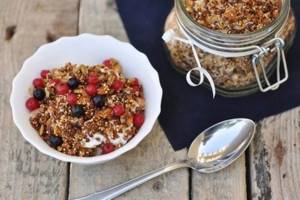
It is also worth considering that each person has his own body characteristics. Some have a good metabolism, others have problems with it. Some lead a sedentary lifestyle, others play sports and have regular physical activity. In addition, concomitant diseases may also have an impact. Everyone loses weight differently too. For some, it is enough to go on a light diet to lose a couple of kilograms, while others need a whole month to achieve this result, and then another month to consolidate it. Everything is individual.
The same thing happens with buckwheat. You need to be especially careful about the combination of foods and the diet as a whole. The first step is to exclude sweets, flour and fatty foods from the menu. Daily physical activity is also advisable. Then you can select the optimal diet option, including healthy buckwheat.
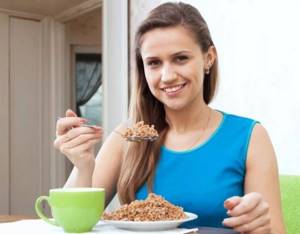
The benefits of buckwheat for weight loss
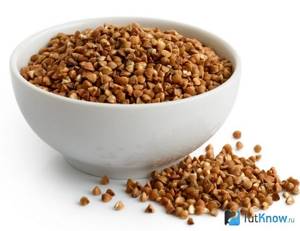
Buckwheat porridge is one of the most popular products, because it is a rich source of nutrients and amino acids necessary for the body to function properly and fully.
100 g of buckwheat contains:
- fiber – 10 g;
- carbohydrates – 61.5 g;
- fats – 3.5 g;
- proteins – 13 g.
No less interesting is the vitamin composition of the product:
- B vitamins;
- vitamin A;
- vitamin P;
- vitamin C.
Buckwheat contains a large number of macro- and microelements:
- copper – 1.1 mg;
- potassium – 460 mg;
- manganese – 1.3 mg;
- calcium – 18 mg;
- selenium – 8.3 mg;
- magnesium – 230 mg;
- zinc – 2.4 mg;
- iron – 2.2 mg;
- phosphorus – 347 mg.
Thanks to its rich composition, buckwheat porridge becomes a unique food product that supplies the body with a large amount of useful substances
:
- Plant protein replaces animal protein, which is valuable for vegetarians.
- Fiber occupies one of the main places in the composition of the product, effectively cleansing the body of accumulated toxins, waste and other harmful substances.
- Buckwheat becomes an ideal product for people of all ages, unless there are contraindications to its use. It is easily absorbed by the body and is suitable for people suffering from diabetes.
- Buckwheat has a high calorie content, so it will be difficult to gain weight if consumed regularly. There is a gradual consumption of slow carbohydrates by the body. Buckwheat is ideal for nutrition during fasting days.
Is it possible to eat buckwheat for dinner at pp. Glycemic index of buckwheat
The energy value of a product is not the only indicator on which you can rely to lose weight. The glycemic index is the rate of breakdown of a product that contains carbohydrates, compared to the rate of breakdown of glucose in the body. The glycemic index of glucose is considered to be the standard and is equal to 100 units. The faster a carbohydrate-containing product is digested, the higher its index. Products are classified:
- low (slow carbohydrates);
- average;
- and high glycemic index (empty carbohydrates).
If you eat a product with a high glycemic index, it will sharply increase your blood sugar levels, followed by a release of the hormone insulin. This is harmful to the body. The main function of insulin for the body is to distribute sugar evenly, while partially converting sugar into subcutaneous fat. Therefore, if we only eat sweets and other foods with a high GI, we will constantly gain weight.
The glycemic index of buckwheat is 50 units, with this indicator, the carbohydrates contained in the cereal are absorbed gradually, and there is no sharp jump in blood sugar levels. Buckwheat itself is digested within 60 minutes. Therefore, buckwheat can be eaten by people with diabetes. You can also eat it for dinner. Slow carbohydrates will help satisfy your hunger for a long time and will not harm your figure. Since the glycemic index is average and the calorie content is low, buckwheat helps you lose weight.
The glycemic index of buckwheat gives green light to eat it for dinner. If you eat foods for dinner whose index exceeds 70 units, the body will intensively begin to produce insulin, which in turn will block the production of somatotropic hormone. He is responsible for night metabolism and weight loss. And the glycemic index of our cereal is only 50 units, so it can be consumed for dinner, and this is another benefit for our body that will help us not to break down in the evening.
The effectiveness of buckwheat for weight loss
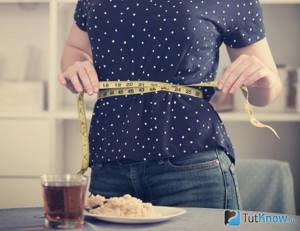
Everyone who wants to lose weight is interested in only one question: is it really possible to lose weight with simple buckwheat? Many people are confused by the calorie content of dry cereal - 340 Kcal per 100 g of product. But the caloric value of boiled porridge is 110 Kcal per 100 g. This indicator is quite acceptable for losing weight. In addition, buckwheat contains no sugar, which is very harmful to your figure.
It’s hard to say exactly how many kilograms you can lose while following a buckwheat diet, because the final result directly depends solely on the individual characteristics of the body. Be sure to take into account your initial weight, additional sports activities and metabolic rate.
Today, a large number of different diet options based on buckwheat are known. The mono-diet is considered one of the most effective. However, doctors and nutritionists warn that using it for a long time is strictly prohibited, as there is a high probability of causing serious harm to your own body. This menu can hardly be called a healthy diet.
You can follow a mono-diet on buckwheat for no longer than 3-5 days. Before starting it, you should first consult a doctor, as it can be dangerous to health, even though buckwheat is rich in valuable substances and microelements.
The basis of any diet is to limit food intake before bed. There are small exceptions - kefir, yogurt and some fruits. If you take a closer look at the composition of this product, it becomes clear that it contains a lot of carbohydrates. If you consume buckwheat porridge throughout the day, your body will be provided with everything it needs while you are awake. Taking buckwheat porridge before bed will cause new fat deposits to appear in the abdomen and thighs.
When following the buckwheat diet, it is forbidden to eat porridge before bedtime. The best option for taking it is breakfast and lunch. Depending on what kind of diet is chosen, the amount of porridge that can be eaten during the day is determined.
The body gradually uses up slow carbohydrates, but this does not mean that buckwheat porridge can be consumed in almost unlimited quantities. It is important to calculate the calorie content of other foods that will be present in the diet. This will help you determine exactly how much buckwheat porridge you can consume during the day to lose weight.
Use in sports nutrition
The rich composition of buckwheat has made it an indispensable product for a sports diet. It is especially highly valued in bodybuilding and other sports disciplines, where nutrition is necessary to gain muscle mass and maintain existing muscles. You can eat this porridge both before visiting the gym and after training, but you need to know the optimal time to take it.
Rational use provides the athlete with the following benefits:
- strengthening the muscular system, muscle growth;
- saturation with proteins, slow carbohydrates, dietary fiber and mineral components;
- acceleration of metabolism, prevention of excess weight;
- reducing blood glucose and cholesterol levels, high blood pressure;
- long lasting feeling of fullness, slow and stable energy;
- increased endurance during intense physical activity;
- removing excess fluid from tissues to get rid of edema.
Before training
Before physical activity, it is necessary to replenish the body's energy reserves. Carbohydrates are necessary for this as they are used by the body as the main source of energy. Buckwheat is suitable for this task; it contains many carbohydrates and can provide an energy boost before a workout. Porridge should account for at least 60% of the total calorie content of the pre-workout meal, the remaining 40% should come from protein. Depending on the ease of absorption of the protein component, the meal should take place 1-2 hours before class. Meat products take longer to digest than other protein sources.
This is true both for strength training aimed at gaining muscle mass, and for exercise for the purpose of losing weight. This range promotes better absorption of creatine, which is often used in pre-workout supplements.
Following these principles will allow you to achieve:
- preparing the body for upcoming physical activity;
- maintaining a stable energy level;
- protection against overvoltage and chronic fatigue;
- supporting physical endurance and productivity.
If you do not eat enough food before training or do not pay attention to its composition and time of consumption, then the energy received will not be enough for a full workout. Energy reserves will run out sooner than expected, fatigue and hunger will appear. At the same time, you should also not overeat before exercise; more does not mean better. The size of your pre-workout meal should be the same as any other meal. The stomach is accustomed to digesting a certain volume, exceeding which will lead to problems such as indigestion, drowsiness, loss of energy, and dizziness.
It is important to wait 1-2 hours before training, as exercise slows down the absorption of food. At the start of training, digestion in the stomach should be completed. It has been scientifically proven that regular consumption of buckwheat helps to achieve psycho-emotional harmony, so you can count not only on the benefits for the body, but also on a good mood.
After training
Athletes' views on the timing of meals before training are similar; with meals after training, everything is not so clear. Opinions differ, everyone chooses what suits him best. Some people eat post-workout amounts during the so-called carbohydrate window. It is believed that it lasts from 15 minutes to an hour after the end of the workout, during this period it is necessary to take carbohydrates to restore energy levels and proteins necessary for muscle tissue. Supporters of other views do not recommend eating earlier than 2-3 hours after the end of the training. For the first couple of hours, they only drink water because they don’t want to put a strain on their digestion.
There is also no consensus on the choice of products. Many athletes insist that immediately after exercise, the body primarily needs carbohydrates. They replenish energy reserves with buckwheat or any other high-carbohydrate product with a small addition of protein, and protein loading is carried out after some time. There are also many supporters of another strategy: take protein as quickly as possible in order to start the processes of muscle tissue restoration and create conditions for its growth, and only then load the body with carbohydrates. There is a third opinion; its supporters insist on an even combination of protein and carbohydrate components.
The choice of regimen depends on the type of training and the individual characteristics of the athlete, especially on the speed of metabolic processes. In any of them there is a place for buckwheat, since despite the predominantly protein composition, it also contains vegetable proteins. However, protein of plant origin does not have a complete amino acid composition. To get all the necessary amino acids, you need to combine buckwheat with other foods.
How much to eat to gain weight?
The daily diet may contain 1-2 buckwheat dishes per day. The serving size varies, depending on the body's needs and energy expenditure. Professional athletes can plan their diet on their own; beginners turn to a coach or nutritionist for help. On average, to gain muscle mass you need to consume 3 grams of carbohydrates, 2 grams of protein and 0.5 grams of fat per kilogram of body weight every day.
Buckwheat cannot be the only source of carbohydrates and vegetable proteins. For health and athletic development, it is important to eat a varied diet. If nutrition plays a more important role in relation to training when it comes to losing weight, then when it comes to gaining muscle mass they are equally important. You won’t be able to build muscle without a well-designed training program.
Rules for losing weight on buckwheat
In order for weight loss on buckwheat porridge to be effective, you need to take into account a few simple rules when preparing your diet. For example, buckwheat should not be boiled, but steamed, which preserves more useful microelements and vitamins. Buckwheat has a fairly pronounced taste, so it can be eaten without adding sugar or salt. This rule is present in most effective diets.
When should you eat porridge?
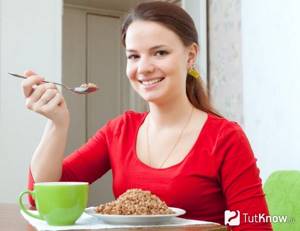
It is recommended to eat buckwheat porridge in the first half of the day, as it takes a long time for it to be absorbed by the body. One of the main advantages of this product is that it provides a long-lasting feeling of fullness. You should not eat buckwheat before bed, as the energy entering the body will not have time to be used up. As a result, it will turn into fat deposits that will settle in the abdomen or thighs.
How often do you eat buckwheat while dieting?
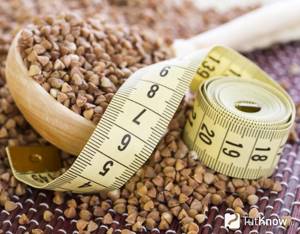
Nutritionists advise consuming buckwheat in small portions for weight loss and no more than 5 times a day. It is important that the portion is not more than 200 g. You cannot eat buckwheat porridge before bed, otherwise you can get the opposite result and instead of losing weight, add a couple of extra pounds.
While following any buckwheat diet, you need to drink at least 2 liters of plain water per day. Soda is strictly prohibited. It is clean water that helps accelerate weight loss and helps the body digest food.
What can you eat buckwheat with?
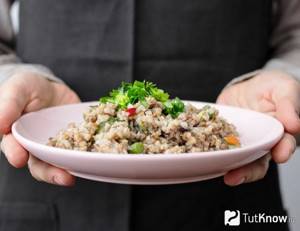
While losing weight, you can cook a delicious vegetable stew or cook a diet soup with boiled meat. You can add a small amount of honey to the porridge, which will be an excellent sweet option for the dish. It is also allowed to use some spices - dill or basil.
List of foods for dinner for weight loss. Product Lists
Can:
- as a source of protein: boiled eggs, low-fat cottage cheese, feta cheese, white cheeses (feta, Adyghe, mozzarella);
- vegetables (you will find the healthiest and lowest-calorie ones in our article at the link);
- beans, chickpeas, lentils;
- greens: feather onion, amaranth, dill, parsley, celery;
- lean fish, seafood;
- boiled lean meat; nutritionists call turkey ideal for dinner (it contains tryptophan, which improves digestion and helps with insomnia), although chicken breast is also suitable;
- spices, spices, but not too hot: cardamom, ginger, ground black pepper, coriander;
- sprouted cereals;
- mushrooms;
- soy products;
- unrefined vegetable oils, freshly squeezed lemon juice, 9% apple or balsamic vinegar, 10% sour cream - for salad dressing.
Drinks include herbal tea, kefir, fresh juices, smoothies, cocktails, dry red wine (no more than 1 glass).
It is forbidden:
- peas, beans (promote flatulence);
- fatty dairy products;
- corn, potatoes, beets, carrots;
- fatty fish;
- fatty meat: pork, lamb, goose, duck;
- flour products;
- sweets;
- dried fruits, nuts, fresh fruits;
- flakes;
- sandwiches;
- dumplings, dumplings and other semi-finished products combining meat and dough;
- fast food, snacks;
- fried foods, canned food, smoked meats.
Drinks include caffeinated drinks, energy drinks, carbonated drinks, and alcoholic drinks.
Controversial issues
Cabbage for dinner provokes increased gas formation at night, but it makes excellent low-calorie diet salads. You can protect yourself from this trouble if you drink dill water half an hour after eating.
Avocado is too high in calories for dinner, but contains amino acids that the body needs at night (we have already talked about the beneficial properties of alligator pear). Therefore, it is recommended to add it in small quantities to salads.
Cereals and pasta are high-calorie foods that are slow carbohydrates. The conclusion is obvious: they will take too long to digest. And if they don’t have time to do this, all the leftovers will go into fat deposits. On the other hand, they provide long-term satiety and prevent night trips to the refrigerator. The second argument for it is that they are good for health.
Solution: if you are on a diet that involves consuming a large amount of carbohydrates, rice, buckwheat and even oatmeal are possible on the evening menu. For people whose work involves heavy physical activity, for men and those who engage in intense strength training, they can also be eaten as a side dish for meat or fish. They are definitely of no use to a woman who is losing weight.
When deciding this issue for yourself, know that nutritionists still recommend leaving cereals for the morning: a proper dinner for weight loss should not contain them.
In Great Britain. The British have dinner late, already around 21.00. They start with wine. The main dishes are roast beef, steaks, vegetable side dishes (legumes, boiled corn, cauliflower) with sauces. The meal ends with tea and something sweet.
Cooking buckwheat porridge for weight loss
If you need to quickly lose weight and get rid of a couple of extra pounds, you can use the buckwheat diet. In this case, you will have to go on a strict diet, but it is not enough just to adhere to a certain principle of the diet, because you also need to know how to properly prepare the porridge. There are several options for preparing buckwheat - with kefir and water. Therefore, everyone will be able to choose a more suitable option for themselves.
Buckwheat porridge on water
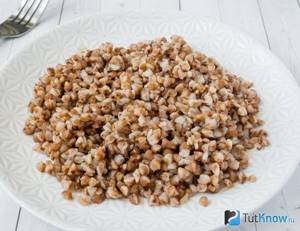
To ensure that buckwheat porridge is not only tasty, but also healthy, you should adhere to the following rules when preparing it:
:
- Diet porridge is not boiled, as it must be infused with water. This dish will be much healthier than boiled porridge.
- Infused buckwheat retains all its beneficial properties and helps to effectively cleanse the body.
- To prepare this dish, take buckwheat and rinse thoroughly with cold water.
- The porridge is filled with water in a 1:1 ratio. Boiling water is used if you need to steam the cereal.
- After 2-3 hours, the diet porridge is completely ready and tastes no different from boiled one.
- This dish also has some disadvantages - you will have to eat buckwheat cold.
- It is not recommended to heat porridge in the microwave, as the body spends more energy on the digestion process.
- Another drawback is the cooking time of the porridge, so it is better to steam it overnight, and in the morning the dietary buckwheat will be completely ready for consumption.
Buckwheat porridge with kefir
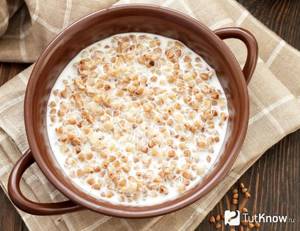
One of the most popular diet options is eating buckwheat with kefir. This method will help you get rid of fat deposits in a relatively short period of time. Buckwheat is quite dry, so kefir goes well with it.
It is best to use a fermented milk product with zero fat content. You can pour kefir over buckwheat or wash down porridge with fermented milk product. It is important to constantly monitor the amount of kefir you drink per day, because this product also has a small percentage of calories.
It is important to follow the regime
Of course, you can eat porridge in the evening, adding vegetables and something protein to it, but don’t eat buckwheat at night, but three hours before you are supposed to go to bed. Perhaps you will say that the regime is always different; you can go to bed earlier or late at night. Yes, but if you want to be a healthy person, then it’s better to plan your diet, sleep and rest patterns. Nothing will happen if you break it 1-2 times for some reason, but in general everything should fit within a certain time frame.
Then you understand how long before you need to have dinner, after which you can drink water or a glass of kefir, but often nutritionists advise replacing it with low-fat cottage cheese. The feeling of hunger goes away in the first days, and after that the body begins to adapt to the new schedule, you will begin to notice that you are full of energy, the weight is slowly coming off, this is a strong motivation to continue.
It is also better to eat on time and 4-6 times a day in small portions, counting BZHU. Taking the time to create a sample menu once will do your body a huge favor. Proper intake of buckwheat, and we are talking about it today, will allow you to get everything you need from the grain, and there are a lot of necessary substances in it.
Buckwheat diet options
Buckwheat is considered one of the most useful and healthy foods. It is recommended to consume buckwheat not only in the fight against excess weight, but also for diseases of the heart and blood vessels. There are several popular options for buckwheat diets that help you lose a couple of extra pounds in a short period of time - a diet for 7 and 14 days.
Diet on kefir and buckwheat for 7 days
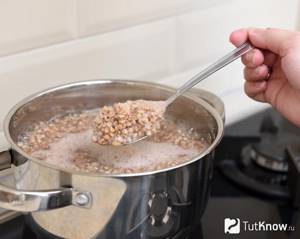
The main food ingredients are buckwheat porridge and kefir. This combination is the most effective, since during a limited diet the body receives all the necessary components. If you follow this diet, you will not be bothered by the feeling of hunger, because buckwheat is a nutritious product.
The body is saturated with fiber, which ensures the removal of toxins from the body, and a pronounced cleansing effect occurs. During the diet, gradual weight loss begins, the unpleasant feeling of heaviness in the lower abdomen is eliminated, and a feeling of lightness appears.
To follow a diet, you need to properly prepare buckwheat porridge
:
- Take 1 tbsp. cereals and pour 2 tbsp. boiling water.
- During the diet, it is recommended to consume 1% and one-day kefir. If kefir lasts longer than 3 days, it means it has a binding effect.
- You can drink no more than 1 liter of kefir per day.
- You need to drink kefir about 30 minutes before your meal.
- You can only eat buckwheat porridge cooked in water.
- Buckwheat can be consumed in almost unlimited quantities.
- During the day there should be 4-5 meals.
- You need to follow the diet for 7 days.
Buckwheat diet for 14 days
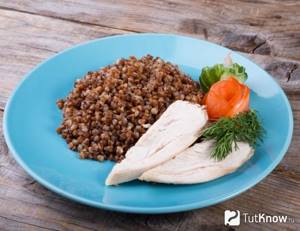
Buckwheat is a valuable source of nutrients and saturates the body with the necessary amount of protein. Helps to get rid of hunger for a long time, has minimal calorie content.
This version of the buckwheat diet is based on the following menu, which must be followed for 14 days
:
- for breakfast, buckwheat porridge cooked in water;
- for lunch – boiled fish or boiled chicken breast (no more than 150 g);
- for dinner - fresh salad with vegetables or seafood (portion should not be more than 200 g).
Buckwheat for dinner at pp. Buckwheat porridge with mushrooms for dinner.
(Buckwheat has a low glycemic index, making it ideal for dinner).
Ingredients:
- Buckwheat - 1 cup.
- Water - 2 cups.
- Champignons - 400 g.
- Onion - 1 pc.
- Parsley - 1 bunch.
- Olive oil - 2 tbsp. l.
- Salt to taste.
- Preparation:
1. Prepare the ingredients.
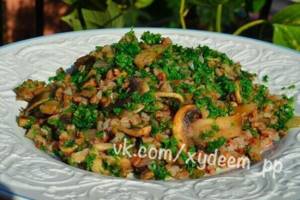
2. First, cook the buckwheat. The ratio of 2 cups of water to 1 cup of cereal is perfect. Pour buckwheat into boiling salted water and reduce heat. An important point: do not stir the cereal poured into the water until the end of cooking. 3. Cook until the water has completely boiled away. You can check how much water has boiled away with a knife: move the porridge a little and look at the bottom. Only if the water has completely boiled away, turn off the heat and cover the finished porridge with a lid. 4. While the porridge is cooking, chop the mushrooms and onions. 5. Fry the onion in a small amount of oil (preferably olive) until the onion is slightly browned. 6. Add mushrooms and continue frying for about 5-7 minutes. 7. Finely chop the parsley. 8. Add mushrooms and parsley to the buckwheat and mix everything carefully. Bon appetit!
Does buckwheat make you fat or lose weight?
So do buckwheat make you fat or not? It all depends on the cooking method and additional products. If you cook porridge with milk, flavor it with butter, or eat it with high-calorie foods (bread, ready-made sauces, mayonnaise, etc.), weight gain is inevitable. They get better not from certain foods, but from their quantity.
Calculating KBZHU is mandatory when losing weight. Individual indicators are calculated depending on age, gender, height and daily activity. There is no clear answer to the question of whether you can gain weight or lose weight from buckwheat. It all depends on your goals.
If you consume cereals daily in excess of your daily caloric intake, this will definitely lead to weight gain. A serving of porridge, which fits into your daily diet and is combined with low-calorie foods, will help you lose extra pounds.
Important. Individual intolerance to buckwheat is rare. In this case, you should completely stop using the product.
How to steam buckwheat overnight
Buckwheat should be of high quality, preferably kernels, not chaff, which has undergone minimal processing, for example, grinding and roasting. For steaming, boiled or distilled water is usually used. To make the dish more nutritious, you can pour kefir over the grains overnight.
By water
Before preparing the porridge, you need to sort out the buckwheat, clean it of foreign impurities and rinse well until the water is clear.
Recipe:
- Place the cereal in a saucepan with a tight-fitting lid.
- Pour boiling water over buckwheat in a ratio of 1:2 (two glasses of water for one glass of cereal). The volume of boiling water can be changed depending on the required consistency (a grainier porridge is obtained by adding less water).
- Close the pan tightly with a lid and wrap it in a warm towel. Leave it overnight.
Buckwheat porridge can be prepared in a similar way using purified water at room temperature. However, such buckwheat will differ from that steamed with boiling water, since the grains will be harder.
Kefir
In combination with kefir, buckwheat cleanses the intestines well of accumulated toxins and waste, ensuring their rapid elimination. Kefir also has a beneficial effect on the body, improves the composition of microflora, and normalizes stool. Kefir can be replaced with matsoni, yogurt, and kumiss.
How to infuse buckwheat with kefir:
- Pour the pre-sorted and washed cereal into a container and pour low-fat kefir in equal proportions.
- Leave overnight for swelling. In the morning, the cereal will be soft and suitable for eating.
In a thermos
The fastest way to prepare buckwheat is in a thermos. In this case, you can reduce the steaming time to 4-6 hours. In addition, the thermos retains heat well, so the porridge remains hot for some time. The recipe is also simple: pour a glass of sorted and clean cereal into a thermos and pour two glasses of boiling water.
Calorie content, BJU and GI of boiled buckwheat per 100 g
Many people are interested in whether it is possible to gain weight from buckwheat. This cereal is a low-calorie product, despite its nutritional value and satiety.
The energy value of boiled buckwheat is 110 kcal per 100 g, and the glycemic index is 40.
For reference. GI (glycemic index) indicators are divided into 3 groups: up to 40 - low, from 40 to 70 - medium, and over 70 - high.
BJU ratio:
- proteins - 4.20 g;
- fats - 1.1 g;
- carbohydrates - 21.3 g.
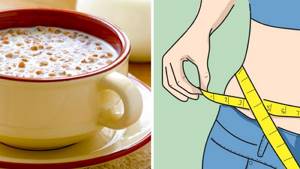
Thanks to slow carbohydrates, cereals fill you up for a long time. In buckwheat cooked in water, fats make up 1.3% of the daily value, proteins - 5.6%, and carbohydrates - 5.8%.
When adding butter or milk to a dish, the BPJU increases significantly. You will not get better from buckwheat in water unless you exceed the daily intake of the product. The daily requirement for buckwheat for an adult is only 200 g.
To save a few calories, buckwheat is steamed and no salt is added. Then the energy value will be only 90 kcal per 100 g of product. Cereals prepared in this way are considered the most healthy and dietary dish.
